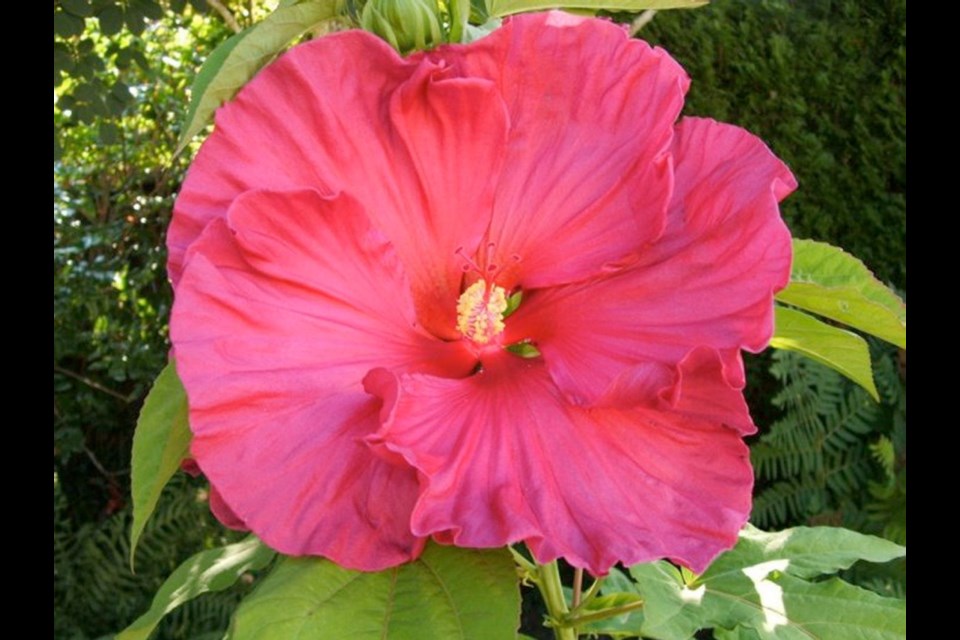As I look back on the gardening year and my ongoing interactions with readers of this column, I am grateful for the many messages, tips and stories they have passed along. Experiences other gardeners have shared often prompt me to introduce new plants to my own garden.
The hibiscus saga comes to mind. It began with my neighbour Tom, who had acquired a large-flowered hibiscus plant from the Veseys bulb catalogue. It bloomed late in the summer with flowers twice the size of the blooms on the commonly grown hardy hibiscus (Hibiscus syriacus), which Tom also grows in his garden.
Tom’s new hibiscus is one of numerous cultivated varieties of H. moscheutos. These shrubs, unlike H. syriacus, die to the ground in winter and send up fresh shoots from soil level in late spring. This growth bears extra-large, spectacular flowers beginning in September.
A collection of these gorgeous plants appeared at a stall at my local farmers’ market in July. The grower had raised them from seed she found listed in the Veseys Seeds catalogue. She had chosen ‘Pink Swirl,’ a lovely confection in pink and white, in the Luna Series of H. moscheutos. Kathy gets the untypically early flowers by keeping the plants in pots and wintering them in an unheated greenhouse. This prompts earlier new growth.
The 2015 Stokes Seeds catalogue has added the new Honeymoon Series of H. moscheutos to its listings, describing the flowers as 15 to 20 centimetres across. “Honeymoon Deep Red is the deepest red ever produced. Honeymoon Light Rose is a bicolour white with a light rose edge and red eye — similar to Luna Pink Swirl.”
Hibiscus moscheutos hybrids are to be found in some local garden centres in the spring. Tom and his wife Marlene found some in May at a nursery near Qualicum Beach.
Monrovia Growers, a major supplier of trees, shrubs and perennials to our local garden centres, lists several of these hibiscus shrubs. Russell Nursery on Wain Road in North Saanich had one of them this year, Crimson Wonder, whose 20-centimetre, deep rose red flowers are gently ruffled.
These are not new plants. They’re just not widely known or distributed. I notice that some older Brentwood Bay Nurseries catalogues from the late 1990s list H. moscheutos ‘Super Rose,’ described as having large, 25-centimetre pink mallow flowers on metre-tall stems.
The late 1990s was around the time that reader Gordon Le Breton began acquiring his 14 plants of this hardy, large-flowered hibiscus. As I spoke with him on the phone Gordon mentioned that he acquired the first of his plants about 15 years ago. One is pure white with a red centre, and of imposing size like all of this type, which he thinks originated in Texas where “everything is bigger.”
Gordon’s plants, like Tom’s, are late to sprout and begin flowering in September. He has grown new plants from cuttings taken from some of the new base growth in late spring.
All this useful information has me hooked on the idea of growing a plant or two in next year’s garden. I’ll try one variety from seed, probably Stokes’ ‘Honeymoon Deep Red,’ and look for Luna Pink Swirl plants at the market in July.
October bouquets. One of my most delightful interactions with readers comes in the form of a sumptuous bouquet of flowers in the fall, right after the Victoria Chrysanthemum Society holds its annual show. One way or another, Jack and Elsie MacAulay have always found someone heading my way to transport the flowers to my home. I found them at my front door this past October — beautiful show chrysanthemums in bright yellow and bronze shades.
I was especially intrigued with the big, light bronze flowers. The inner surface of each recurved petal was coloured a subtle yet vivid burgundy.
Growing show chrysanthemums is a passion for some hobby gardeners. Mel, my next door neighbour, grew the plants in years past and has acquired new plants through a VCS contact. He is pleased to have returned to nurturing these beauties. The society, founded in 1940, holds a public sale of cuttings in April.
For information on the society and its meetings, type “Victoria Chrysanthemum Society” into a search engine and click on bcgardenclubs.com. Or, email [email protected].



